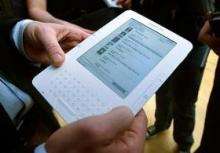I never need to worry about whether I can read a book. As long as a book's a book, that is -- printed on paper, in English. I know I can pick it up and read it no matter how long it sits on my shelf after I bought it. But as we move into the era of e-books, that assumption no longer holds.
In certain cases, you can't read the electronic book you buy from one store on a device supported by a competing store. Similarly, you can't read e-books you borrow from your library if you don't have the right kind of device. And there's a chance you won't be able to read the e-books you buy today on the e-book reader you own several years from now.
Does anyone in the books business realize how dumb this is? Seems not. Because just when the situation seemed to be getting better, it suddenly got worse.
E-books -- books available in digital form and typically distributed over the Internet -- have been around for years. But they've only really started to take off in recent years with the release of portable e-book readers by Sony and Amazon.com.
Amazon's Kindle was a top seller during the holidays for the online store. For books that it offers in both digital and physical editions, Amazon sells six e-books for every 10 traditional ones. Meanwhile, Sony sold four times more Readers this past December than it did the previous one.
Many other companies are jumping into the business. Barnes & Noble recently launched its Nook device. Technology companies such as Plastic Logic and DMC Worldwide plan to launch their own competing devices and e-book stores later this year.
And then there's Apple. One of the key features of its recently unveiled iPad is the iBooks app, which includes both an e-book reader and a digital bookstore.
Until Apple announced its iPad, you could have argued that the industry seemed to be solving the compatibility problem. Although numerous e-book formats have existed over the years, the industry seemed to be coalescing around a standard called EPUB that was specifically designed for use by e-books. And many bookstores and libraries that wanted to limit what consumers could do with e-books had signed on to digital rights management (DRM) software from Adobe.
As of last month, that widespread support for EPUB and Adobe's DRM left Amazon, which uses its own proprietary file format and copy protection technology, as the only major holdout. That's a big deal because of the popularity of the Kindle, but there was a chance that market pressure for a standard might eventually force Amazon to acquiesce.
But thanks to the iPad and iBooks, the pressure on Amazon just got a lot lighter. As Steve Jobs noted when he introduced the iPad, iBooks is supporting the EPUB format. What he didn't say, though, was that Apple plans to use its own DRM software to wrap around its books, not Adobe's.
That means you won't be able to read books you buy in iBooks on your Nook or Sony Reader, even though they're all in the EPUB format. It also means that you won't be able to use the iBooks app to read books you purchase from Barnes & Noble or Sony, or the e-books you borrow from your library.
Apple has already shown great ability to sell digital content such as music and movies, and there's every reason to believe that it will become a big player in the e-books market as well. If it does, two of the industry's biggest players will be offering e-books that are incompatible not only with each other's readers, but with those of the rest of the business.
To be sure, there are some ways around the problem. Both Amazon and Barnes & Noble offer e-book applications for Apple's iPhone. Assuming that Apple will allow those programs to run on the iPad, consumers could still access e-books bought from those two stores on the device. They just wouldn't be able to read them with the iBooks app. And they still couldn't read books bought from iBooks on a Kindle or a Nook.
The lack of compatibility may not matter in many cases. I rarely want to reread, or even keep, popular fiction books. Similarly, many consumers may not mind not being able to move books to a new device if they switch to a reader with a different format.
But there are lots of books I've kept in my library for years. Even if I rarely refer back to them, I love that I can.
I don't think people will lose that attachment to certain books as they move to digital readers. But they may lose their ability to maintain their libraries unless publishers, bookstores and makers of the devices find some way to play nice with each other.
(c) 2010, San Jose Mercury News (San Jose, Calif.).
Distributed by McClatchy-Tribune Information Services.























